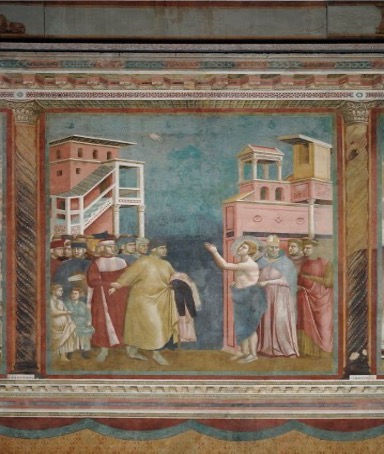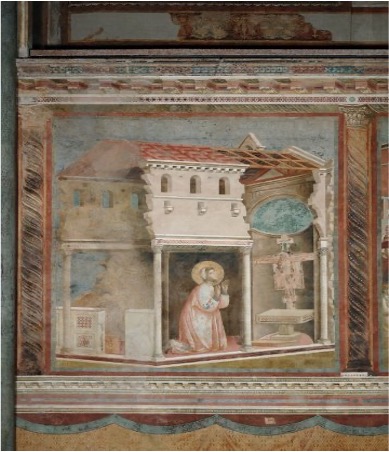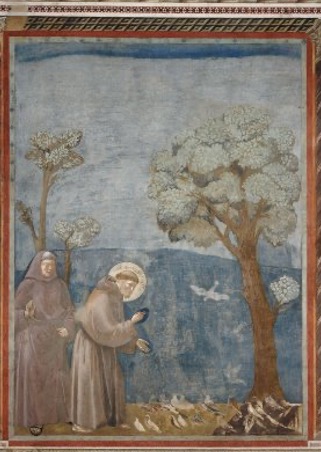On 22nd April 2024, The Oxford Group held the 83rd Annual General Meeting. Newly appointed Executive Director, Denis Nowlan, closed the meeting with the personal reflection below.
St Francis Reflection
We began today’s meeting with a prayer of praise by St Francis of Assisi. Margaret [former Chair of Trustees] has asked me to end our gathering with some reflections on the life of Francis. You might think the life of a poor Italian monk, 800 years ago, would have little to say to us today. We certainly shouldn’t pretend that he is our contemporary. His world is as distant from ours in its values and mentality as it is in time. And yet, he remains one of those outstanding, magnetic individuals who seems to appeal afresh to each age, and to people of every kind and culture and belief.
Francesco Bernardone was born in the hill town of Assisi in 1182, into an aspirational merchant family with trading links with France – perhaps a French mother. Certainly, Francis was inspired – intoxicated even, in his youth by the chivalric poetry and song of Provence. His dreams were of brilliant military triumphs – and triumphs, too, in love. He was a party guy, at the centre of a circle of carefree and daring young friends. But after an experience of illness and captivity, he began to see his future differently, to realise that he was called to a higher form of warfare, a bigger conception of love.
One thing I find fascinating about Francis is that he isn’t a one-off story of conversion but a lifelong journey away from egoism to universal compassion. He is always learning, always growing, always conscious of his own inadequacy but joyfully convinced of the love of god, and alert to the presence of god in all things.
A critical moment for him is his encounter, while on pilgrimage, with homeless beggars and with people suffering from leprosy – people not just marginalised but far outside the margins of society.
He discovers among them a new kind of freedom and joy – and he realises that it is possessions and wealth, that fatally separate us from one another, feeding our selfishness, our pride and aggression.
Francis takes the commands of the gospel quite literally. He reads the story of the rich young man whom Jesus urges to give all he has to the poor. And he does just that. Not just all that he has, but some of his father’s goods, too – so his father summons him before the local bishop for stealing. Francis famously responds by renouncing his father, and his inheritance, dramatically stripping naked in the public square. You have to feel for his father in his outrage and dismay, seeing his talented son becoming – you might say – radicalised.
That’s the thing with Francis. He is radical. He goes to the root of things. He prays before the cross and he seems to hear Christ saying to him, ‘Rebuild my church which is in ruins.’ So he starts literally to repair a ruined chapel. Gradually, he realises that his mission is bigger than that. It’s impossibly big. To rebuild the whole Christian community – which in his day meant the whole of society, torn apart by greed, class distinctions, and endless wars between neighbouring cities.
His love of the natural world was so deep, so instinctive, that he was in communion with it to an extraordinary degree. Everyone knows about Francis preaching to the birds. There’s another level to the story – for the birds he spoke to were of every kind, birds of prey and the ones they would normally prey on – so Francis is bringing harmony and love in place of conflict and fear.
He is often called on to act as a peacemaker between warring cities, which he does not through skilful diplomacy or smooth words but through the force of his profound humility and compassion.

St. Francis renouncing his inheritance. Traditionally attributed to Giotto, ca.1266-1337.

Miracle of the Crucifix of San Damiano. Traditionally attributed to Giotto, ca.1266-1337

St Francis preaching to the birds. Traditionally attributed to Giotto, ca.1266-1337.
He then goes a step further. He lives in the era of crusades – a clash of civilisations between the worlds of Christianity and Islam. He decides to join a crusade, not as a soldier but in the hope of meeting Moslems and persuading them of the truth of the gospel. In Egypt, there is a stand-off, during a siege, between the Crusaders and the Arab armies. Francis sets off, with a companion, across no man’s land, towards enemy lines. He seems totally without fear, although some of his followers have been killed while preaching in Moslem lands. The Arab soldiers capture him and take him into the presence of the Sultan, al-Kamil. There follows the most remarkable cross-cultural encounter. Francis preaches to the sultan – they enter into a dialogue – no one is converted but they discover a deep respect for each other – and Francis is allowed to return safely to his camp, carrying gifts – carrying also a sense of admiration for the prayerfulness submission to God’s will that he found in Islam.
Francis never intended to found a religious order. But his life and his character were so attractive that men and women flocked to join him. So he had to find some way to organise them, to develop a rule, a code of conduct. It must be said that Francis was pretty hopeless at organisation, and managing people. He needed other people who had those talents. Also, things didn’t always go well. In fact, his order was already divided at the time of his death – and more so as years went by – between people with different interpretations of what it means to be a Franciscan. But then, Francis didn’t really want anyone to be a Franciscan. He just longed for everyone to discover the joyful freedom of the love of God.
‘Preach the gospel, at all times’, he urged his companions. ‘And, when all else fails, use words.’
It is impossible to quantify the impact of a single life – but it is certain that few individual lives have reverberated so deeply and widely and for so long, as that of Francis. It is clear that the Franciscan movement, which spread rapidly across Europe and then the world, played a part in a profound shift in values. It changed how people saw the dignity of the human person. It finds expression in art, from Giotto to Anthony Gormley, in poetry, from Dante to Seamus Heaney, in the thousands of women and men who have joined Franciscan orders to serve as teachers, doctors and nurses, friends to those whom society rejects, and the millions more who have been moved to follow his example, changing our world in countless ways.
May I invite you to join me in the Franciscan prayer for peace?
The prayer for peace
Lord, make me an instrument of your peace:
where there is hatred, let me sow love;
where there is injury, pardon;
where there is doubt, faith;
where there is despair, hope;
where there is darkness, light;
where there is sadness, joy.
O divine Master, grant that I may not so much seek
to be consoled as to console,
to be understood as to understand,
to be loved as to love.
For it is in giving that we receive,
it is in pardoning that we are pardoned,
and it is in dying that we are born to eternal life.